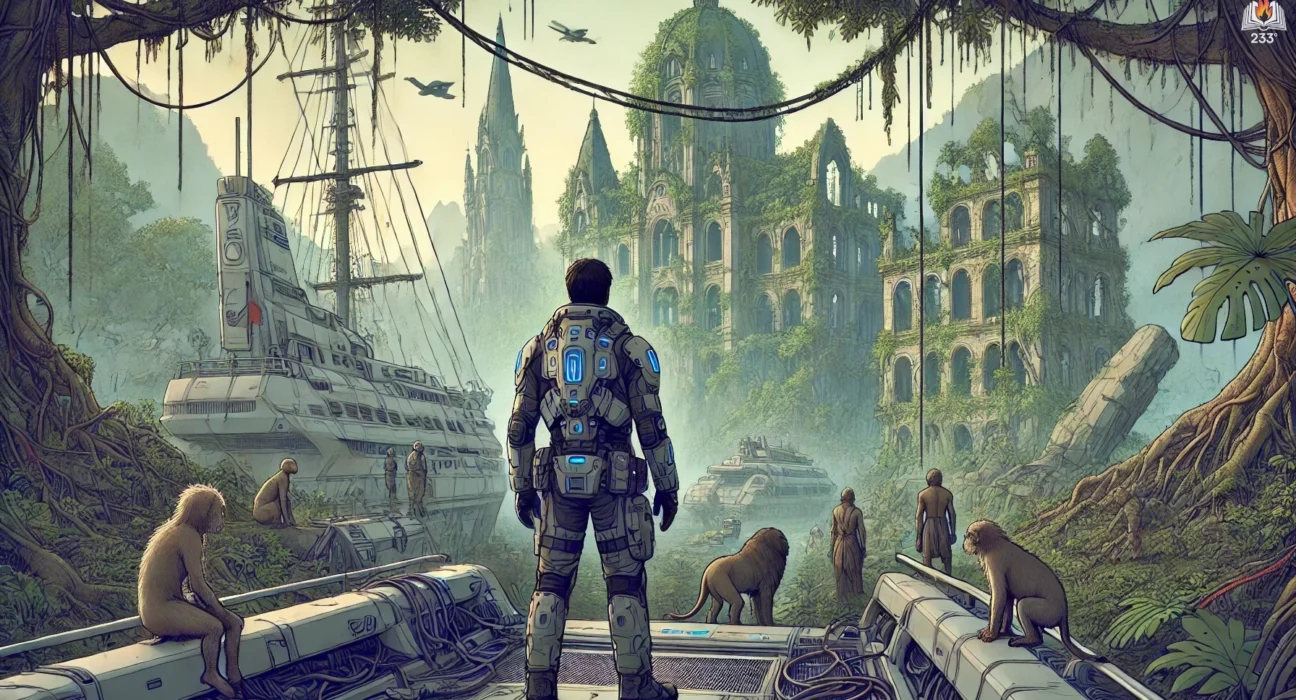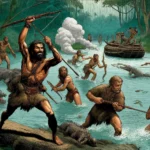“The Lost Continent” is a science fiction novel by Edgar Rice Burroughs, published in 1916. The story is set in the distant future, in the year 2137, where Europe has been cut off from the Americas for over two centuries following a cataclysmic war. The protagonist, Lieutenant Jefferson Turck of the Pan-American Navy, accidentally crosses into the forbidden zone beyond the 30th meridian, embarking on an adventure in a Europe that has regressed into savagery.
Plot Summary
Lieutenant Jefferson Turck, a young officer in the Pan-American Navy, was born into a world where the Western Hemisphere had been isolated from the Eastern Hemisphere for over two centuries. The devastation of the Great War had prompted this separation, with the Atlantic and Pacific Oceans becoming deadly mine-strewn barriers. No man of the West dared cross the 30th and 175th meridians, which marked the boundaries of the Pan-American Federation’s domain.
Turck’s life changed when his aero-submarine, the Coldwater, faced mechanical failures while patrolling the 30th meridian. Struggling against a fierce storm and broken engines, the Coldwater drifted dangerously close to the forbidden zone. Though Turck and his crew made every effort to maintain their course within the allowed waters, fate had other plans. As the ship crossed into the forbidden territory, the gravitation-screen generators failed, leaving them powerless and adrift in uncharted waters.
Facing the inevitability of crossing the 30th meridian, Turck found himself in a moral quandary. The regulations of his nation were strict, and crossing the dead line was considered high treason. Yet he chose not to succumb to despair or the rigid traditions that would condemn him. With his loyal first officer, Alvarez, and the crew by his side, Turck resolved to defy the unjust law and explore the unknown lands beyond thirty. Their journey was not merely one of survival but also of discovery—of learning what had become of Europe after centuries of isolation.
After days of drifting and repairs, Turck and his men finally sighted land—the coast of ancient England. As they approached the shore, they marveled at the lush, untamed wilderness that had overtaken what was once a seat of civilization. The landscape was desolate of human activity, and the cities that had once thrived there were now buried beneath centuries of wild overgrowth. They were in Devonport, or what remained of it, and their explorations soon revealed a grim truth: Europe had not progressed like Pan-America but had instead regressed into a primeval state.
Their encounter with a terrifying beast confirmed this harsh reality. Felis tigris, a creature known only from ancient records, attacked Delcarte, one of Turck’s men. The tiger was a formidable opponent, but together they managed to bring it down. The presence of such creatures so far from their native Asia puzzled Turck and hinted at the collapse of human dominance over the continent. Further explorations revealed that these beasts were not an isolated case but roamed the land in great numbers.
Seeking supplies and hoping to find survivors of civilization, they ventured further inland. In the Isle of Wight, they encountered the Grubittens, a primitive tribe that had no knowledge of the world beyond their island. The Grubittens spoke a distorted form of English and had no understanding of history, literature, or the concept of cities. They were warriors, living in camps, fighting tribal wars, and fearing the wild beasts that roamed the mainland. The once-great England was now divided into Eastenders and Westenders, tribes who had forgotten their heritage and knew nothing of the wider world or the ancient cities that had once dotted their land.
Desiring to find some remnant of the Europe that once was, Turck and his men set their sights on London. They navigated the Thames, a waterway that had once been the lifeblood of a great empire but now lay silent and desolate. The absence of ships, lighthouses, or any signs of the bustling commerce that had defined this river in the past marked the full extent of civilization’s decay. The lieutenant’s heart sank as he realized the magnitude of the catastrophe that had befallen Europe.
Further upriver, they disembarked to hunt for food and stumbled upon antelope grazing near the ruins of what had once been Erith. But even here, nature had reclaimed the land. As Turck closed in on his prey, a new wonder presented itself—a massive, grey-black beast, its colossal shoulders towering above the ground. It was an African elephant, a creature once native to the distant continent. Before Turck could grasp this marvel, the scene turned chaotic. From the underbrush leaped a massive lion, striking down one of the antelopes. Turck watched in awe and horror as the king of beasts displayed the raw power and majesty long lost to the domesticated creatures of his homeland.
Turck’s fascination with the untamed wilderness gave way to a grim determination. The presence of these creatures suggested a complete collapse of human civilization, a reversion to a world where nature reigned supreme. The men of Pan-America, who had lived in comfort and peace for generations, were ill-prepared for this savage new reality. But Turck knew that to survive and to understand the fate of Europe, they must continue their journey.
As they ventured further, the party encountered more signs of Europe’s regression into barbarism. They came across scattered remnants of ancient cities, now little more than crumbling ruins overrun by jungle and wild beasts. The cities of the ancients, once bustling with human life and industry, were now ghostly echoes of a past glory, swallowed by the relentless march of time and nature. The cities had fallen, their people either destroyed by war or devoured by the creatures that had since dominated the land.
Turck and his men pressed on, their quest no longer just a matter of survival but a mission to uncover the truth about what had happened to the world beyond thirty. They sought answers to the great mystery that had shrouded Europe for over two centuries. But with each step they took deeper into the continent, it became clear that humanity’s hold on this land had been tenuous at best, easily shattered by the twin forces of war and nature’s reclamation. The lost continent held its secrets close, revealing them only to those bold enough to seek them out, and Jefferson Turck was determined to unravel them, no matter the cost.
Main Characters
- Lieutenant Jefferson Turck: The protagonist and narrator of the story. A young and adventurous officer of the Pan-American Navy, Turck is brave, curious, and determined. He leads his crew on an unintended voyage into the unknown, confronting the dangers and mysteries of the lost continent.
- Snider: One of Turck’s crew members, who exhibits skepticism and a conservative mindset. He is less enthusiastic about exploring the forbidden territories and adheres strictly to rules and regulations.
- Taylor: A young crew member, he shows eagerness and willingness to explore the new world. His character represents the spirit of adventure and curiosity about the unknown.
- Delcarte: Another crew member who demonstrates courage and resourcefulness. He shares Turck’s excitement about exploring the uncharted territories of Europe.
Theme
- Isolationism and Its Consequences: The story explores the idea of what happens when civilizations isolate themselves. The Americas, having sealed themselves off from Europe for centuries, have progressed technologically while Europe has regressed into barbarism.
- The Savage versus the Civilized: The novel contrasts the advanced and orderly society of Pan-America with the primitive and chaotic state of Europe. This theme delves into the fragility of civilization and how quickly it can devolve.
- War and Its Devastation: “The Lost Continent” reflects on the destructiveness of war, portraying Europe as a desolate wasteland where humanity has been driven back into a primitive state.
- Adventure and Exploration: The novel embodies the spirit of adventure, with Turck and his crew exploring uncharted lands, encountering unknown dangers, and discovering a world forgotten by their own society.
Writing Style and Tone
Burroughs employs a direct and action-packed narrative style in “The Lost Continent.” His language is vivid and descriptive, bringing to life the desolate landscapes and wild encounters that Lieutenant Turck experiences. The tone is adventurous and often nostalgic, particularly when reflecting on the lost grandeur of European civilization. Burroughs’ prose is brisk, keeping readers engaged with a steady pace of unfolding mysteries and dangers. His writing is also imbued with a sense of wonder and curiosity, characteristic of early science fiction, as he explores the what-ifs of a future world reshaped by isolation and conflict.
We hope this summary has sparked your interest and would appreciate you following Celsius 233 on social media:
There’s a treasure trove of other fascinating book summaries waiting for you. Check out our collection of stories that inspire, thrill, and provoke thought, just like this one by checking out the Book Shelf or the Library
Remember, while our summaries capture the essence, they can never replace the full experience of reading the book. If this summary intrigued you, consider diving into the complete story – buy the book and immerse yourself in the author’s original work.
If you want to request a book summary, click here.
When Saurabh is not working/watching football/reading books/traveling, you can reach him via Twitter/X, LinkedIn, or Threads
Restart reading!








